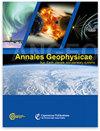全球电离层图(GIM)网格中电子总含量(TEC)值差异的特征分析
IF 1.9
4区 地球科学
Q3 ASTRONOMY & ASTROPHYSICS
引用次数: 0
摘要
摘要。利用全球电离层图(GIM)中的电子总含量(TEC)进行电离层延迟校正是消除卫星导航和定位中电离层误差的常用方法。在此基础上,可通过全球电离层图网格 TEC 插值获得穿刺点的 TEC。然而,就网格而言,只有少数研究分析了其四个网格点的 TEC 值大小特征,即网格点之间的 TEC 差异特征。有鉴于此,本文利用 CODE(欧洲轨道测定中心)提供的高太阳活动年(2014 年)和低太阳活动年(2021 年)的 GIM 数据,提出网格 TEC 差值作为分析网格内 TEC 变化特征的一种方法,有利于探索和分析单站区域电离层 TEC 的变化特征。太阳活动率高的年份其值较大,太阳活动率低的年份其值一般较小,且高纬度地区的值总是小于低纬度地区的值。具体来说,在太阳活动率高的年份,高纬度和中纬度地区的 GIM 网 TEC 内部差异大多在 4 TECu(1 TECu = 1016 电子 m-2)以内,而低纬度地区只有 78.17%。在太阳活动率低的年份,GIM 网格内的 TEC 差值大多小于 2 TECu,高纬度和中纬度地区的 TEC 差值大多在 1 TECu 以内。这项分析的主要发现是,大多数全球信息模型网格的网格热电导率差值较小,尤其是在低太阳年的中纬度至高纬度地区。这意味着,当需要这些全球信息模型网格内的 TEC 时,可以简化相关的提取方法和过程。本文章由计算机程序翻译,如有差异,请以英文原文为准。
Characteristic analysis of the differences between total electron content (TEC) values in global ionosphere map (GIM) grids
Abstract. Using total electron content (TEC) from a global ionosphere map (GIM) for ionospheric delay correction is a common method of eliminating ionospheric errors in satellite navigation and positioning. On this basis, the TEC of a puncture point can be obtained by GIM grid TEC interpolation. However, in terms of grid, only few studies have analyzed the TEC value size characteristics of its four grid points, that is, the TEC difference characteristics among them. In view of this, by utilizing the GIM data from high solar-activity years (2014) and low solar-activity years (2021) provided by CODE (Center for Orbit Determination in Europe), this paper proposes the grid TEC difference as a way of analyzing TEC variation characteristics within the grid, which is conducive to exploring and analyzing the variation characteristics of the ionosphere TEC in the single-station area. The value is larger in high solar-activity years and generally small in low solar-activity years, and the value of high-latitude areas is always smaller than that of low-latitude areas. Specifically, in high solar-activity years, most of the GIM grid TEC internal differences are within 4 TECu (1 TECu = 1016 electrons m−2) in high-latitude and midlatitude regions, while only 78.17 % are in low-latitude regions. In low solar-activity years, the TEC difference values within a GIM grid are mostly less than 2 TECu, and most of them in the high and middle latitudes are within 1 TECu. The main finding of this analysis is that the grid TEC differences are small for most GIM grids, especially in the midlatitudes to high latitudes of low solar years. This means that relevant extraction methods and processes can be simplified when TEC within these GIM grids is needed.
求助全文
通过发布文献求助,成功后即可免费获取论文全文。
去求助
来源期刊

Annales Geophysicae
地学-地球科学综合
CiteScore
4.30
自引率
0.00%
发文量
42
审稿时长
2 months
期刊介绍:
Annales Geophysicae (ANGEO) is a not-for-profit international multi- and inter-disciplinary scientific open-access journal in the field of solar–terrestrial and planetary sciences. ANGEO publishes original articles and short communications (letters) on research of the Sun–Earth system, including the science of space weather, solar–terrestrial plasma physics, the Earth''s ionosphere and atmosphere, the magnetosphere, and the study of planets and planetary systems, the interaction between the different spheres of a planet, and the interaction across the planetary system. Topics range from space weathering, planetary magnetic field, and planetary interior and surface dynamics to the formation and evolution of planetary systems.
 求助内容:
求助内容: 应助结果提醒方式:
应助结果提醒方式:


